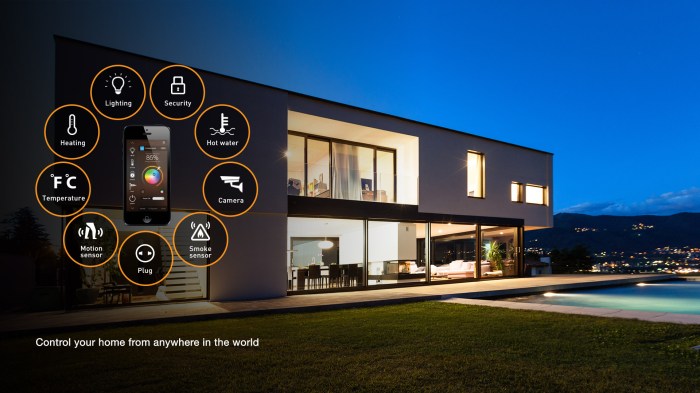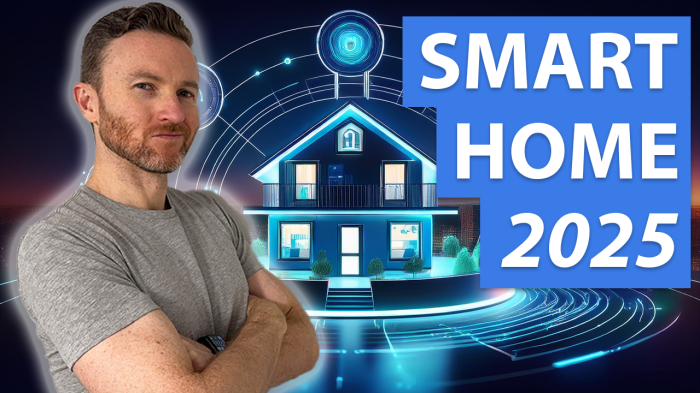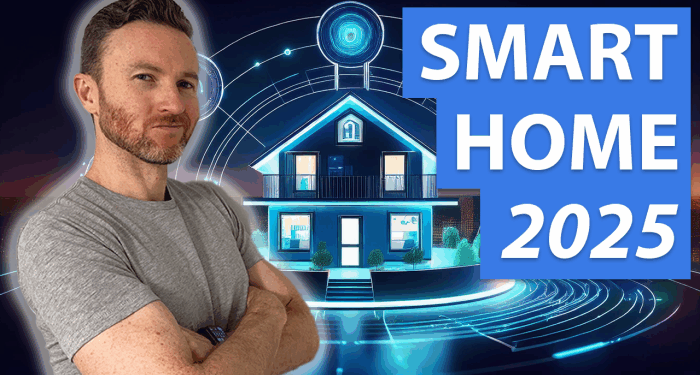As Top Smart Home Systems That Actually Save You Money in 2025 takes center stage, this opening passage beckons readers with casual formal language style into a world crafted with good knowledge, ensuring a reading experience that is both absorbing and distinctly original.
In this digital era, the evolution of smart home systems has revolutionized the concept of modern living. Imagine a home that not only caters to your needs but also helps you save money - that's the magic of the top smart home systems in 2025.
Let's delve into the realm of efficiency and cost-effectiveness that these systems offer.
Introduction to Smart Home Systems
Smart home systems are innovative technologies that enable homeowners to automate and control various aspects of their homes remotely. These systems utilize interconnected devices and sensors to monitor and manage functions such as lighting, heating, security, and entertainment.
Main Features of Smart Home Systems
- Remote Access: Allows homeowners to control devices and settings from anywhere using a smartphone or computer.
- Automation: Enables scheduling and programming of devices to operate at specific times or in response to triggers.
- Energy Efficiency: Monitors and optimizes energy usage to reduce waste and lower utility bills.
- Security Integration: Includes features like smart locks, cameras, and sensors for enhanced home security.
Benefits of Having a Smart Home System
- Cost Savings: By optimizing energy usage, smart home systems can lead to significant reductions in utility bills over time.
- Convenience: Remote access and automation make it easier to manage and control home functions, enhancing overall convenience for homeowners.
- Enhanced Security: Integration with security features provides peace of mind and improves the safety of the home.
- Increased Property Value: Homes equipped with smart systems are more appealing to buyers and can increase the overall value of the property.
Top Smart Home Systems for Saving Money
Smart home systems are not only convenient but can also help you save money in the long run. By investing in the right technology, you can reduce energy consumption, improve efficiency, and lower utility bills. Here are some of the top smart home systems available in 2025 that can help you save money:
1. Smart Thermostats
Smart thermostats like Nest and Ecobee can learn your heating and cooling preferences, adjust settings based on your habits, and optimize energy usage. By reducing unnecessary heating or cooling, you can save up to 10-12% on heating and 15% on cooling costs annually.
2. Energy Monitoring Systems
Energy monitoring systems like Sense or Neurio can track your electricity usage in real-time, identify energy-hungry appliances, and suggest ways to reduce consumption. By being more aware of your energy usage, you can make informed decisions to cut down on unnecessary expenses.
3. Smart Lighting
Smart lighting systems such as Philips Hue or Lutron can be controlled remotely, set on schedules, or adjust brightness based on natural light. By optimizing your lighting usage, you can reduce electricity bills and extend the lifespan of your bulbs, saving you money in the long term.
4. Smart Water Leak Detectors
Smart water leak detectors like Flo by Moen or Phyn Plus can detect leaks in your plumbing system, alert you in real-time, and help prevent costly water damage. By addressing leaks promptly, you can avoid expensive repairs and lower your water bills.
5. Smart Home Security Systems
Smart home security systems like Ring or SimpliSafe offer advanced features like motion detection, remote monitoring, and smart alerts. By deterring burglaries, reducing false alarms, and enhancing overall security, you can potentially save on insurance premiums and prevent property loss.
Energy-Efficient Features
Smart home systems come equipped with a variety of energy-efficient features that not only help reduce your carbon footprint but also save you money in the long run.
Smart Thermostats
Smart thermostats are designed to learn your heating and cooling preferences and adjust the temperature accordingly. By optimizing your HVAC system's usage, smart thermostats can significantly reduce energy waste and lower your utility bills.
LED Lighting
LED bulbs are more energy-efficient than traditional incandescent bulbs, consuming less electricity and lasting longer. Smart home systems can automate lighting schedules or adjust brightness levels to further maximize energy savings.
Energy Monitoring
Many smart home systems offer energy monitoring features that allow you to track your energy consumption in real-time. By identifying energy-intensive devices or behaviors, you can make informed decisions to reduce wastage and save on electricity costs.
Solar Panel Integration
Integrating solar panels with your smart home system can harness renewable energy to power your household. Excess energy generated can be stored or sold back to the grid, offsetting your electricity costs and promoting sustainability.
Automation and Cost Savings

Automation in smart home systems plays a crucial role in saving money by streamlining processes, reducing energy waste, and optimizing resources. By automating various tasks, homeowners can enjoy both convenience and financial benefits.
Examples of Automated Tasks for Cost Savings:
- Thermostat Control: Smart thermostats can adjust the temperature based on your schedule, saving energy when you're not home.
- Lighting Control: Smart lighting systems can turn off lights in unoccupied rooms or adjust brightness levels to save electricity.
- Appliance Management: Smart plugs can automatically power off devices when not in use, preventing standby power consumption.
Financial Benefits of Automation:
- Reduced Energy Bills: By optimizing energy usage through automation, homeowners can see significant savings on their utility bills.
- Preventive Maintenance: Automated systems can detect issues early, preventing costly repairs and prolonging the lifespan of appliances.
- Time Savings: Automation frees up time that would otherwise be spent on manual tasks, allowing homeowners to focus on other priorities.
Integration with Renewable Energy Sources

Smart home systems can seamlessly integrate with renewable energy sources such as solar panels, wind turbines, or geothermal systems. By connecting these renewable energy sources to the smart home system, homeowners can optimize their energy usage and reduce their reliance on traditional grid power.Using renewable energy in a smart home offers significant financial advantages.
Homeowners can generate their own electricity, reducing or even eliminating their monthly utility bills. Additionally, many governments offer incentives, rebates, or tax credits to encourage the adoption of renewable energy, further reducing the upfront costs of installation.Incorporating renewable energy into a smart home also leads to long-term cost savings.
Once the initial investment in renewable energy infrastructure is made, homeowners can benefit from free, sustainable energy for years to come. This can result in substantial savings over the lifespan of the renewable energy system, making it a financially wise choice in the long run.
Monitoring and Optimization
Smart home systems are equipped with advanced monitoring capabilities that track energy usage in real-time. By collecting data on electricity consumption from various devices and appliances, these systems provide detailed insights into where energy is being used and how it can be optimized for cost savings.
Energy Usage Monitoring
- Smart meters: These devices measure electricity consumption at different intervals throughout the day, allowing homeowners to track usage patterns and identify areas for improvement.
- Appliance monitoring: Smart plugs and sensors can monitor individual appliances, providing data on their energy consumption and efficiency.
- Data visualization: Smart home systems often include user-friendly interfaces that display energy usage data in charts and graphs, making it easy for homeowners to understand their consumption habits.
Optimization Features
- Energy scheduling: Smart home systems can automate the timing of certain appliances to run during off-peak hours when electricity rates are lower, reducing overall costs.
- Smart thermostats: These devices can adjust temperature settings based on occupancy and weather conditions, optimizing heating and cooling efficiency for energy savings.
- Lighting controls: Smart lighting systems can adjust brightness levels and turn off lights in unoccupied rooms to minimize electricity usage.
Data Analytics for Optimization
- Data-driven insights: Smart home systems analyze energy usage patterns and provide recommendations for optimizing consumption, such as adjusting settings or upgrading to more energy-efficient devices.
- Predictive analytics: By using historical data and machine learning algorithms, these systems can forecast future energy needs and suggest strategies for reducing costs over time.
- Continuous monitoring: Real-time data monitoring allows homeowners to make immediate adjustments to their energy usage based on recommendations from the smart home system, maximizing savings potential.
Security Systems and Cost Benefits
Smart home security systems not only provide peace of mind but also offer significant cost-saving benefits. Investing in a smart security system can lead to financial gains in the long run by preventing potential losses and enhancing overall home security.
Preventing Theft and Property Damage
- Smart security cameras and sensors can deter burglars and intruders, reducing the risk of theft and property damage.
- Real-time alerts and notifications allow homeowners to take immediate action in case of suspicious activities, preventing potential losses.
- Integration with smart lighting and alarm systems can further enhance security measures, making it less likely for intruders to target the property.
Insurance Discounts and Savings
- Many insurance companies offer discounts to homeowners with smart security systems installed, as they are considered less risky and more secure.
- By reducing the likelihood of break-ins and property damage, homeowners can enjoy lower insurance premiums and potential savings in the long term.
- Some insurance providers even offer additional benefits and coverage options for homes equipped with advanced security features, leading to further financial advantages.
Remote Monitoring and Control
- Smart security systems allow homeowners to monitor their property remotely, providing peace of mind and the ability to address security concerns from anywhere.
- By remotely controlling security cameras, alarms, and smart locks, homeowners can prevent unauthorized access and potential security breaches, avoiding costly incidents.
- The convenience of remote monitoring and control not only enhances home security but also contributes to cost savings by preventing security-related expenses.
Ending Remarks

In conclusion, the landscape of smart home systems in 2025 is not just about convenience and luxury; it's about tangible savings and sustainable living. Embracing these technologies not only enhances our daily routines but also paves the way for a more financially prudent future.
Stay ahead of the curve and watch your home transform into a hub of efficiency and economy.
FAQ Explained
How do smart home systems actually save you money?
Smart home systems save money by optimizing energy usage, automating tasks to reduce wastage, integrating renewable energy sources for cost-efficiency, and enhancing security to prevent financial losses.
Are smart home systems expensive to install?
While the initial cost may seem significant, the long-term savings from reduced energy bills and efficient management make smart home systems a worthwhile investment.
Can smart home systems be customized to suit individual needs?
Yes, smart home systems offer a high level of customization to cater to specific preferences and requirements, ensuring optimal efficiency and savings.



